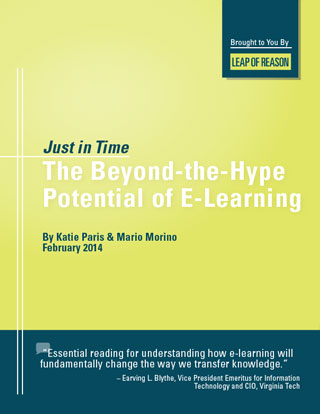
If you are interested in advancing your career or are responsible for helping others to do so, I’d go so far as to say it’s required reading. The way we learn and how we get information to do our jobs effectively is changing fast, and you need to understand the trends in order to stay a step ahead.
The report is absolutely packed with spot-on insights and dozens (maybe hundreds) of links to invaluable resources. Like a good “Learning Concierge (see page 28),” I tried to grab a few nuggets that struck me in order to break it into a few bite-sized chunks for you (see page 17). I share 10 headlines and a direct quote from the report to whet your appetite to read more.
WHICH OF THESE CONCEPTS RESONATE WITH YOU?
PLEASE COMMENT BELOW AFTER YOU PERUSE THEM.
1. What You Need to Know, You Need to Know Right Now.
“Over the next ten years, we will see, finally, the realization of ‘just-in-time learning’— being able to access information easily and inexpensively at the precise moment of relevance.”
2. What You Really Need Is a Certifiable Competency, NOT a 4-Year Degree.
“We will see many more employers move away from an exclusive focus on ‘seat time; and credit hours for determining whether candidates are qualified for positions. Employers will give increasing weight to competency-based assessment and certification, which offer the promise of faster, more effective career training, job searching, and matching of skills to needs.”
3. You Already Know What You Need to Learn (And How You Best Learn It).
“Learning consumers—especially young people for whom digital environments are second nature—are in the driver’s seat. And in our knowledge-driven economy, those who know how to fill knowledge gaps by themselves and skillfully curate content for others are in increasing demand.”
4. Let Me Know What You Need to Know and I’ll Go Get It for You!
“As employers seek to leverage e-learning offerings for talent development within their organizations, we will see the mainstreaming of the ‘learning concierge’ —content navigation experts who help others find and customize the content they need to learn in order to progress in their careers.”
5. You Want Learning in Bite-Size Chunks.
“Analysts and experts we consulted almost universally praised the Khan Academy model, which features learning curricula made up of short, modular, easily accessible videos and exercises, available to anyone where they are, when they need them, for what they need, multiple times, and at no cost. Instead of long lectures, Sal Khan and other Khan Academy instructors break down lessons into learning sequences along a knowledge map that students can follow to build mastery of any subject.”
6. You Want to Mix and Match Those Mini Modules.
“But the real power of disaggregation, or chunking, rests in its potential for remixing and revising content. Even just-in-time learning chunks can be part of a pedagogical sequence that conveys a bigger picture. When content is disaggregated and freely available to anyone anywhere, people who learn differently can go at their own pace.
7. You Want the Best Mix of Both In-Person and Online.
“We will see ‘blended learning’ proliferate, as organizations experiment with ways to make their educational offerings more relevant, personalized, and interactive, not just cheaper and more scalable.”
8. You Want More Than a Video of a Lecturer Droning On.
“… just putting content online doesn’t change anything. For instance, how many Massively Open Online Courses (MOOCs) have done nothing more than videotape a professor’s lecture? Granted, more people can access the course if it’s delivered online. But was the lecture good to begin with, and how, if at all, was it made better?”
9. You Can’t Wait for the Next Open Enrollment Course.
“According to the 70-20-10 model, 70% of workplace learning occurs from on-the-job experiences; 20% through peers, coaches, and mentors; and only 10% from formal classroom training.”
10. You Might Be Self-Directed, But You’re Not Learning Alone.
“Just as students have always gathered in libraries to study in groups (and will continue to do so as modern libraries evolve), they are using Facebook, Twitter, and other platforms to help each other with homework, prepare for tests, and share notes and thinking. They are also using social media sites to find fellow students and plan times to meet in person, whether for a study group or a party.
Summary
Trust me when I suggest that these 10 gems merely scratch the surface when it comes to the wealth of information in this report. The authors also include a section called, “Ways to Get Started” within your organization as well as with external audiences, and they included an excellent list of resources to help you get caught up on this subject quickly.
Can I Help You Move In This Direction?
As always, please also let me know if there’s anything I can do to help you move traditional events and training to the virtual space. GovLoop sees itself as a massive “learning hub” or
“knowledge network” for government that has been providing these kinds of social, e-learning opportunities for public sector professionals for years – and would like to advance this
GOVLOOP RESOURCES
- “Building Better Conferences and Training: The Value of Virtual Events in Government.” Read or download it here.
- Results of a Social Learning Pilot Project with the U.S. Office of Personnel Management (OPM). Learn more here.
- Full List of GovLoop’s Virtual Expertise Click here to read more about our virtual training and events activities.